|
|
|
Sort Order |
|
|
|
Items / Page
|
|
|
|
|
|
|
| Srl | Item |
| 1 |
ID:
117185
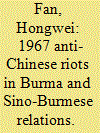

|
|
|
|
|
| Publication |
2012.
|
| Summary/Abstract |
Anti-Chinese riots broke out in Rangoon on 26 June 1967. The riots, which resulted from Chinese students' defiance of the Burmese government's ban on wearing Mao badges in school, led to the deterioration of Sino-Burmese relations, symbolised by the cessation of 'Pauk Phaw' ties and the subsequent shift in China's foreign policy which included open intervention in Burma's civil war. The riots contributed to estranged relations between Beijing and Rangoon throughout the 1970s and 1980s despite the normalisation of bilateral ties in 1970. While the roots of the Rangoon riots lay in Burma's political economy and tensions within the local Chinese community in the context of Cold War international relations, Beijing bore primary responsibility, however, due to its export of the Cultural Revolution.
|
|
|
|
|
|
|
|
|
|
|
|
|
|
|
|
| 2 |
ID:
076578


|
|
|
| 3 |
ID:
179337
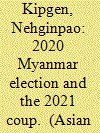

|
|
|
|
|
| Summary/Abstract |
In the 2020 general election, the National League for Democracy (NLD) won 920 of the total 1,117 seats, which was upped by 61 seats from its win in the 2015 election. The main opposition party, the Union Solidarity and Development Party (USDP), won 71 seats, down 46 from the 2015 election when it won 117 seats. The election result gave a strong mandate to the NLD for another five years. On the other hand, the USDP accused the NLD of engaging in electoral fraud including the buying of votes, and called for fresh elections in coordination with the military. Following a complaint from its proxy party, the USDP, the military initially said it would conduct an investigation in 218 townships where the military personnel and their family members cast their votes, which it expanded to 314 townships in all states and regions across the country; this finally led to the declaration of a state of emergency rule (the military coup) on 1 February 2021. Ethnic parties also alleged that the NLD government made certain pre-poll decisions that disadvantaged the ethnic minorities. This paper analyzes the electoral process and its outcome in an attempt to understand whether the election led to the deepening of democracy or the widening of division in the country's democratization process.
|
|
|
|
|
|
|
|
|
|
|
|
|
|
|
|
| 4 |
ID:
131247
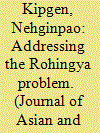

|
|
|
|
|
| Publication |
2014.
|
| Summary/Abstract |
The simmering tension between Rakhine Buddhists and Rohingya Muslims in Western Myanmar escalated into a violent conflict in 2012, first in June and again in October. The violence led to the loss of over a hundred lives, destruction of thousands of homes, and the displacement of tens of thousands of people. The Myanmar government intervened to end the bloodshed but tension continues to linger. This article argues that, instead of alienating the Rohingyas politically, consociational democracy should be pursued to address the problem. The support and cooperation of both Buddhists and Muslims, and perhaps assistance from a neutral organization like the United Nations, would help achieve a political solution.
|
|
|
|
|
|
|
|
|
|
|
|
|
|
|
|
| 5 |
ID:
100830
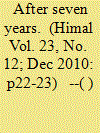

|
|
|
| 6 |
ID:
039076
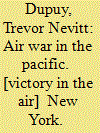

|
|
|
|
|
| Publication |
New York, Franklin Watts, Inc., 1964.
|
| Description |
89p.Hbk
|
| Series |
Military History of World War II
|
| Contents |
Vol. XIV
|
|
|
|
|
|
|
|
|
|
|
|
Copies: C:1/I:0,R:0,Q:0
Circulation
| Accession# | Call# | Current Location | Status | Policy | Location |
| 008106 | 940.54/DUP 008106 | Main | On Shelf | General | |
|
|
|
|
| 7 |
ID:
090568
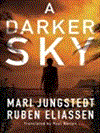

|
|
|
|
|
| Publication |
2009.
|
| Summary/Abstract |
One of the key tools for achieving India's stated ambition of stopping national fragmentation in the Northeast is the Armed Forces (Special Powers) Act (1958) (AFSPA). This article assesses Indian Government efforts to manage the parts of the Indo-Burmese borderlands that are subject to this law. It compares the approaches of governments on the Burmese and Indian sides of the frontier and interrogates the financial incentives that complement security policies in their shared borderlands. Economic incentives for ceasefire and disarmament are, I argue, part of a portfolio of pacification and reintegration strategies that are premised on the controlled ambiguities of the borderlands. As such, I argue that the impunities allegedly at the heart of the AFSPA are matched by the freedom of the Indian Government to funnel resources into paying off its enemies. In the Indian case, the wider environment in which the AFSPA is implemented cannot be ignored if a full analysis of its 50 years of operation is to be offered. The implementation of surrender agreements in the ambiguous space of the Indo-Burmese borderlands exemplifies how the Indian Government has prioritised national cohesion above legal, political or economic consistency.
|
|
|
|
|
|
|
|
|
|
|
|
|
|
|
|
| 8 |
ID:
032321


|
|
|
|
|
| Publication |
London, WeidenFeld and Nicolson, 1973.
|
| Description |
xiii, 346p.: ill., mapshbk
|
| Standard Number |
0297765159
|
|
|
|
|
|
|
|
|
|
|
|
Copies: C:1/I:0,R:0,Q:0
Circulation
| Accession# | Call# | Current Location | Status | Policy | Location |
| 011497 | 923.5611/NIC 011497 | Main | On Shelf | General | |
|
|
|
|
| 9 |
ID:
023771
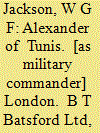

|
|
|
|
|
| Publication |
London, B.T. Batsford, 1971.
|
| Description |
vii, 333p.hbk
|
|
|
|
|
|
|
|
|
|
|
|
Copies: C:1/I:0,R:0,Q:0
Circulation
| Accession# | Call# | Current Location | Status | Policy | Location |
| 008387 | 923.5611/JAC 008387 | Main | On Shelf | General | |
|
|
|
|
| 10 |
ID:
126046
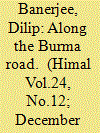

|
|
|
|
|
| Publication |
2011.
|
| Summary/Abstract |
Yunnan was one of the worst-hit areas during World War II, almost completely destroyed by Japanese bombing. By today the province has been rebuilt, however, and the old Burma Road - that icon of the war, used to transport support material for the Allies into China - has been upgraded into a six-lane highway. Once it crosses the Chinese border, however, this potentially lucrative land link between China and India falls into disrepair, despite years of plans to upgrade it. On the Indian side, the Ledo Road (or Stilwell Road, after an American general), links up to the Burma Road, and is indeed motorable. But it too falls into disrepair on the Burma side.
|
|
|
|
|
|
|
|
|
|
|
|
|
|
|
|
| 11 |
ID:
011566
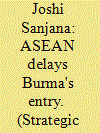

|
|
|
|
|
| Publication |
Jan-Feb 1997.
|
| Description |
1589-1591
|
|
|
|
|
|
|
|
|
|
|
|
|
|
|
|
| 12 |
ID:
083822
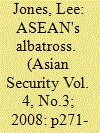

|
|
|
|
|
| Publication |
2008.
|
| Summary/Abstract |
Following the abortive "Saffron Revolution" of autumn 2007, Burma's ASEAN partners were subject to the timeworn criticism that the grouping persistently fails to act against its pariah member due to its near-religious adherence to the norm of non-interference. Conversely, this paper argues that ASEAN's policy towards Burma has never been one of strict non-interference, but has always been premised on the claim that ASEAN can encourage political change there. Moreover, the non-interference principle has come under increasing pressure since the Asian financial crisis. The article tracks the evolution of ASEAN's policy, from the adoption of constructive engagement in 1988, through the gradual frustration of ASEAN's designs, to its present position of critical disengagement, arguing ASEAN's failure to take a stronger line has less to do with any binding "norms" than with the interests of the region's predominantly illiberal elites and the grouping's increasing difficulties in achieving meaningful consensus
|
|
|
|
|
|
|
|
|
|
|
|
|
|
|
|
| 13 |
ID:
104101
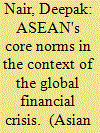

|
|
|
|
|
| Publication |
2011.
|
| Summary/Abstract |
Has the global financial and economic crisis provided stimulus for institutional development in ASEAN? Exploring the empirical trends concerning ASEAN's plans for a comprehensive community by 2015, it is a argued that no such developments have emerged. Instead, two alternative sources for potential change in ASEAN's institutional norms are elaborated
|
|
|
|
|
|
|
|
|
|
|
|
|
|
|
|
| 14 |
ID:
083531
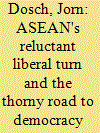

|
|
|
|
|
| Publication |
2008.
|
| Summary/Abstract |
New liberal spaces in several Southeast Asian countries have created a window of opportunity for non-state actors to lobby for the promotion of democracy and human rights in ASEAN. Democratically elected governments cannot ignore the voices of their constituencies and consequently promote liberal values at the regional level. This is mainly the case for Indonesia and the Philippines, and the other member states find it difficult to close their eyes to liberal agendas. Both Jakarta and Manila follow a foreign policy strategy of reforming ASEAN into an organization that actively subscribes to democratic values, as the process of negotiating the ASEAN Charter demonstrated. The charter gives evidence of the group's cautious liberal turn as it explicitly identifies the rule of law, good governance, democratic principles and constitutional government as essential elements of political order. However, it is a long way from the cautious acceptance of general democratic values to the active promotion and regional enforcements of rules based on these norms. In view of the diversity of political systems and ideologies within ASEAN, it comes as no surprise that the association as a collective actor is unable to agree on any meaningful strategy as to how to support and respond to political change. ASEAN's failure to use diplomatic leverage to pressure its member Burma for political reforms is a case in point. At the same time ASEAN does not impede democracy, and future analysts might be looking back on the commitment to core democratic values in the ASEAN Charter as the pre-stage of regional-democracy promotion.
|
|
|
|
|
|
|
|
|
|
|
|
|
|
|
|
| 15 |
ID:
125207
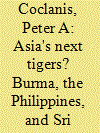

|
|
|
|
|
| Publication |
2013.
|
| Summary/Abstract |
President Obama's post-election visit to Asia last November was a vivid reminder that America is in the process of making a strategic pivot east. That Burma was one of his destinations was good for many reasons, one of which was to remind the development community that this country is once again full of potential, as it was half a century ago. Indeed, in the 1960s Burma, along with the Philippines and Sri Lanka (then Ceylon), was seen as one of the most likely candidates in Asia to follow Japan into sustained economic growth. The fact that neither Burma nor Ceylon nor the Philippines ever quite made it-indeed, for different reasons, each became an also-ran in terms of development-is an interesting story in its own right, but a topical one too. After years of frustrated hopes and dashed expectations, each of these countries, surprisingly, has another chance to fulfill its long-stalled potential. Development delayed, it seems, is not necessarily development lost.
|
|
|
|
|
|
|
|
|
|
|
|
|
|
|
|
| 16 |
ID:
126105
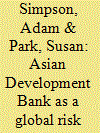

|
|
|
|
|
| Publication |
2013.
|
| Summary/Abstract |
The Asian Development Bank (adb) is engaged in development projects throughout the Greater Mekong Subregion, although for most of the past two decades it has boycotted Myanmar (Burma) because of donor government sanctions. Despite being criticised for its neoliberal focus and its lack of transparency and accountability, the adb's operations compare favourably to those of the Myanmar government and many transnational corporations constructing and financing projects there. This article engages with the concept of risk, which increasingly frames how development in fragile states like Myanmar is understood, to critically analyse the adb's nascent re-engagement in Myanmar according to the risks this poses for five constituencies: the adb itself; donor states; the Myanmar government and military; private capital; and marginalised communities. While deeper engagement in Myanmar poses different risks for each group, critical analysis suggests that the adb must increase the genuine participation of civil society actors in its activities to address the most significant risks of all, those facing marginalised communities.
|
|
|
|
|
|
|
|
|
|
|
|
|
|
|
|
| 17 |
ID:
079084
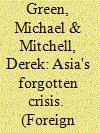

|
|
|
|
|
| Publication |
2007.
|
| Summary/Abstract |
Over the past decade, Burma has gone from being an antidemocratic embarrassment and humanitarian disaster to being a serious threat to its neighbors' security. The international community must change its approach to the country's junta
|
|
|
|
|
|
|
|
|
|
|
|
|
|
|
|
| 18 |
ID:
044231
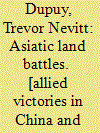

|
|
|
|
|
| Publication |
New York, Franklin Watts, Inc., 1963.
|
| Description |
66p.Hbk
|
| Series |
Military History of World War II
|
| Contents |
Vol. X
|
|
|
|
|
|
|
|
|
|
|
|
Copies: C:1/I:0,R:0,Q:0
Circulation
| Accession# | Call# | Current Location | Status | Policy | Location |
| 008102 | 940.5425/DUP 008102 | Main | On Shelf | General | |
|
|
|
|
| 19 |
ID:
083492
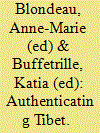

|
|
|
|
|
| Publication |
Berkeley, University of California Press, 2008.
|
| Description |
xxix, 364p.hbk
|
| Standard Number |
9780520244641
|
|
|
|
|
|
|
|
|
|
|
|
Copies: C:1/I:0,R:0,Q:0
Circulation
| Accession# | Call# | Current Location | Status | Policy | Location |
| 053907 | 951.505/BLO 053907 | Main | On Shelf | General | |
|
|
|
|
| 20 |
ID:
082023
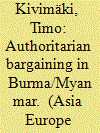

|
|
|
|
|
| Publication |
2008.
|
| Summary/Abstract |
Despite the political controversy related to the authoritarian bargaining of Burma/Myanmar's territorial conflicts, it is important to acknowledge the successes and admit the failures of the process of ceasefire negotiation and the national convention process of the Myanmar-government. Regardless of what we think of the Myanmar government, there can still be both good and bad elements in the process. This article will focus, as the general focus of this special issue suggests, on the negotiations between the central government and the ethnic groups on autonomy and territorial solutions in the peripheries of Burma/Myanmar
|
|
|
|
|
|
|
|
|
|
|
|
|
|
|
|
|
|
|
|
|